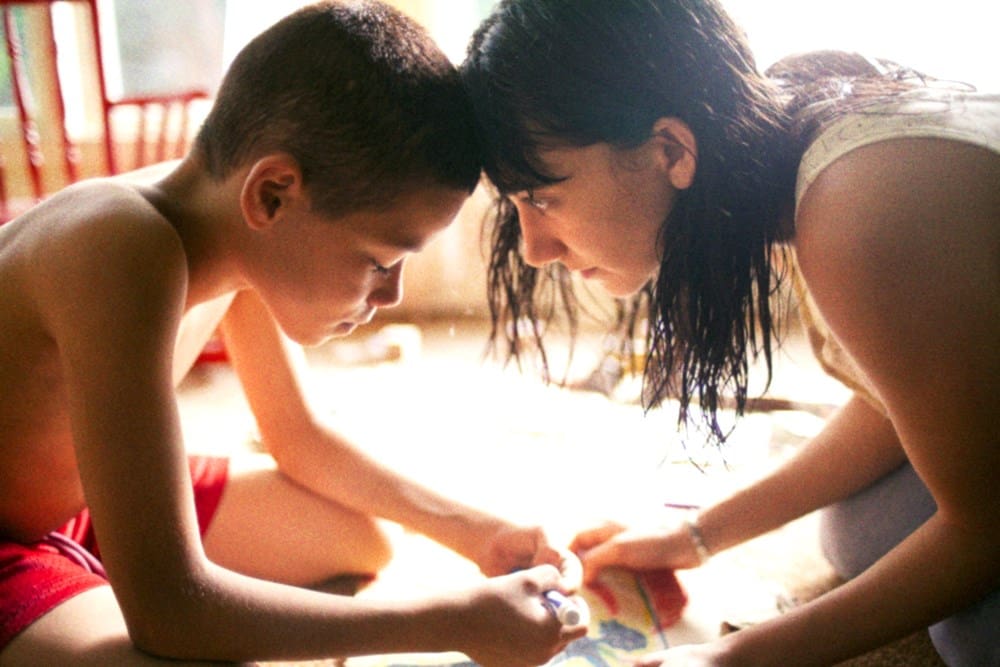
Released in 2011, Justin Torres’s début novel We the Animals is technically a novel, but what happens to its lead character, Jonah, is largely autobiographical. Like Jonah, Torres grew up in upstate New York with his wild brothers. His writing is blunt and evocative, like poetry turned prose.
The new film adaptation of the book by director Jeremiah Zagar turns the story back into poetry again. He and co-writer Daniel Kitrosser begin by giving the story a coherent narrative. Torres’s novel is more episodic and impressionistic, slowly allowing the reader to realize that Jonah is growing and learning who he is apart from his brothers. Zagar does the same here, somehow still making the boys’ story feel spontaneous and surprising even though nearly every moment was storyboarded by Zagar and artist Hugo Costa. It’s difficult to attribute why the film works to any single element, but the young actors are a big factor.
The titular animals are played by a trio of real, non-actor, New York kids, Isaiah Kristian as Manny, Josiah Gabriel as Joel and Evan Rosado as the youngest and most sensitive, Jonah. The boys are close in age and while they each have clear personalities, there are moments when they seem like some feral pack of puppies or benign versions of the witches three in Macbeth. There is something secret and almost strange to their connection that separates them from everyone else, but it also allows them to weather the worst moments in their parents’ relationship.
The parents, meanwhile, are played by professional actors, with Raúl Castillo as the father and Sheila Vand as the mother. Since the boys are the focus, Castillo and Vand’s performances are understated, but both actors still convey the wildly passionate and often dangerous connection the adults share. Though the film takes place in upstate New York, the boys’ parents clearly moved from New York City and though we don’t get backstory, we can guess from the tension between them and their struggle to provide for their children just how hard they’ve had it.
Still, as interesting as that backstory might be, Torres’s book is told from Jonah’s perspective and the film is too. While Zagar uses voiceover a few times early on, his ingenious solution for allowing us to really see things from Jonah’s perspective is to animate the pages of his journal and even his dreams. Though his original plan was to simply show the pages of Jonah’s journal onscreen, Zagar and his crew ultimately thought they came off a little flat, so he tapped artist, Mark Samsonovich, to animate the sequences. Using a method in which each drawing was xeroxed, the overall affect is more tactile than traditional animation and expresses just how active and special Jonah’s imagination is. Flashbacks of the near-drowning at the beginning of the film suddenly morph into scratchy black pencil drawings of Jonah floating taking flight.
A big part of Jonah’s arc is realizing he’s different from his brothers in some fundamental way and Rosado delivers that beautifully. There’s a constant attentiveness and fear in his expression that makes Jonah feel vulnerable when his brothers seem to adapt to any situation. That’s not to say Manny and Joel are oblivious to the emotions Jonah seems to feel so acutely, on the contrary, they react with as much upset as Jonah when their parents fight. They’ve simply lived with their parents’ violence longer than Jonah, but that also means they’ve already started to integrate that violence and destructiveness into their personalities and Jonah eventually becomes their target.
Even without foreknowledge of the book, Jonah is simply too vulnerable not to end up hurt in some way before the film ends. Though Zagar’s denouement is somewhat less upsetting than Torres’s, it’s still pretty rough. Still, even with that intense drama, We the Animals is ultimately a sweeter film than it first appears to be. It’s about self-discovery and as tough as that road can be, there is nothing quite so liberating as discovering exactly who you are.
Rating: 8/10

